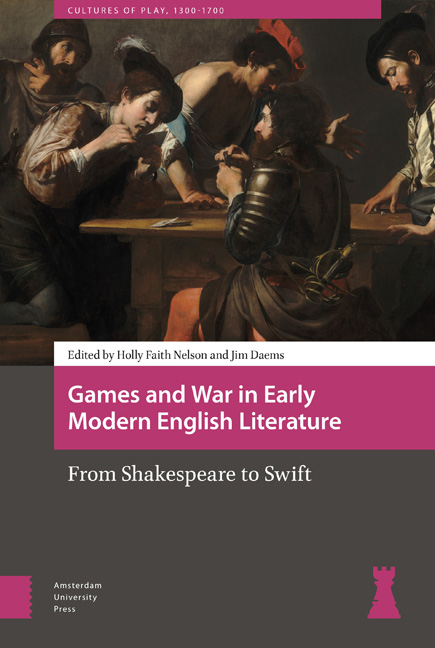Book contents
- Frontmatter
- Dedication
- Contents
- Acknowledgements
- The Interplay of Games and War in Early Modern English Literature: An Introduction
- 1 ‘Can this cock-pit hold the vasty fields of France?’ Cock-Fighting and the Representation of War in Shakespeare’s Henry V
- 2 Game Over: Play and War in Shakespeare’s Troilus and Cressida
- 3 Thomas Morton’s Maypole: Revels, War Games, and Transatlantic Conflict
- 4 Milton’s Epic Games: War and Recreation in Paradise Lost
- 5 Ciphers and Gaming for Pleasure and War
- 6 Virtual Reality, Role Play, and World-Building in Margaret Cavendish’s Literary War Games
- 7 Dice, Jesting, and the ‘Pleasing Delusion’ of Warlike Love in Aphra Behn’s The Luckey Chance
- 8 War and Games in Swift’s Battle of the Books and Gulliver’s Travels
- 9 Time-Servers, Turncoats, and the Hostile Reprint: Considering the Conflict of a Paper War
- Index
9 - Time-Servers, Turncoats, and the Hostile Reprint: Considering the Conflict of a Paper War
Published online by Cambridge University Press: 21 November 2020
- Frontmatter
- Dedication
- Contents
- Acknowledgements
- The Interplay of Games and War in Early Modern English Literature: An Introduction
- 1 ‘Can this cock-pit hold the vasty fields of France?’ Cock-Fighting and the Representation of War in Shakespeare’s Henry V
- 2 Game Over: Play and War in Shakespeare’s Troilus and Cressida
- 3 Thomas Morton’s Maypole: Revels, War Games, and Transatlantic Conflict
- 4 Milton’s Epic Games: War and Recreation in Paradise Lost
- 5 Ciphers and Gaming for Pleasure and War
- 6 Virtual Reality, Role Play, and World-Building in Margaret Cavendish’s Literary War Games
- 7 Dice, Jesting, and the ‘Pleasing Delusion’ of Warlike Love in Aphra Behn’s The Luckey Chance
- 8 War and Games in Swift’s Battle of the Books and Gulliver’s Travels
- 9 Time-Servers, Turncoats, and the Hostile Reprint: Considering the Conflict of a Paper War
- Index
Summary
Abstract
The cultural memory of the civil wars loomed large in Stuart England during the Restoration, the Exclusion Crisis, and the Glorious Revolution through to the Hanoverian succession. Paper wars played a key role by stoking fears in a politically partisan way. This chapter argues that one key political tool in the paper wars was the reprinting of tracts from earlier in the century in order to expose the true colours of political gamesters, time-servers (notably turncoats and Vicars of Bray) who were perceived as threatening the stability of the nation. The hostile reprint recontextualized the spectres of the past in order to address ongoing political crises which might devolve into physical violence.
Keywords: early modern print culture; early modern public sphere; Allegiance Controversy; political loyalty in Stuart England
Does a paper war have real casualties, or is it only play-fighting? For writers in late seventeenth-century England, from the Restoration of 1660 to the Hanoverian succession of 1714, this was an active question. The recent civil wars continued to loom large in the public imagination, and the emergence of Whig and Tory political parties in the 1680s made printed texts a battleground of sorts. The texts of broadsheets, pamphlets, and other printed ephemera kept the civil wars alive in virtual form, as partisan writers adopted idioms associated with Roundhead and Royalist and printers reissued work from earlier in the century. This virtual war kept pace with ongoing military conflict in the wars with the Dutch Republic (1665-1667, 1672-1674) and the War of the Spanish Succession (1701-1714). Contentious claims in print resembled a kind of weaponry, reminiscent of the use of propaganda for rousing the public to take up arms.
The term ‘paper war’ denotes an event that occurs when the contest to influence public opinion through the medium of print leads to the proliferation of pamphlets and other textual materials. The back-and-forth of competing pamphlets gave paper form to this contest, and periodic lapses in the licensing acts served as an accelerant. Notable among such events were the Exclusion Crisis of the early 1680s and the Sacheverell Controversy of 1710-1711. In a broader sense, ‘paper war’ also serves to denote partisan exchange more broadly, as indicated by the anonymous writer of A Vindication of Dr. Henry Sacheverell (1710), when he remarked: ‘I have no desire to enter into a Paper War with so Weak and Trifling an Adversary’.
- Type
- Chapter
- Information
- Games and War in Early Modern English LiteratureFrom Shakespeare to Swift, pp. 179 - 200Publisher: Amsterdam University PressPrint publication year: 2019

